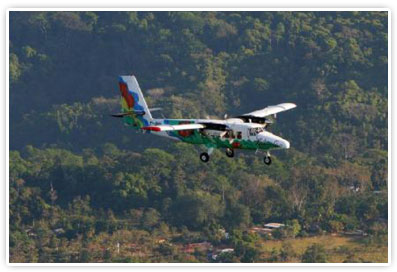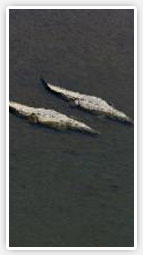RESOURCES
RESOURCES: CASE STUDIES
| Author : | Tourism for Tomorrow Awards |
|---|---|
| Section : | WTTC Tourism for Tommorrow Awards Case Studies |
| Year : | 2009 |
 | NaturAir, Costa RicaConservation Award Winner 2009 |
In 2004, NatureAir made a pledge to reduce fossil fuel use in both its air and ground operations, and that same year it announced that its operations had become carbon neutral. The carbon-offsetting programme is non-voluntary and is included in the air ticket price. NatureAir does not want its customers to feel as though they are being taxed for a carbon neutral flight – it is simply part of the experience. The company has integrated the offset cost into its budget as a line item that is not expendable. |
Since the project’s inception, NatureAir has compensated for nearly 20,000 tons of carbon dioxide though the protection of more than 500 acres of high-biodiversity tropical forests in Costa Rica.
A full 100% of its annual emissions are offset through a Costa Rican Government forestry programme partnership with the National Forestry Financing Fund (Fondo Nacional de Financiamiento Forestal – FONAFIFO), in which local landowners voluntarily agree to conserve their land and leave trees standing for a year’s worth of financing, as opposed to deforesting the land for timber or cattle. This national programme involves 8,000 properties and has preserved 10% of Costa Rica’s forests. NatureAir assists in FONAFIFO’s stringent monitoring by checking these forested areas from the air and on foot. While one farmer identified that the money, at US$64 per hectare, was a nice supplement, he sees the true value of the project as helping his neighbours and friends understand the environmental value of their land.

Since 2001, the airline has reduced its fleet fuel consumption by 7%. NatureAir scrutinises flight plans and identifies inefficient routes, revamps its itineraries and timing with a staggered schedule that avoids runway backups and taxi time, and trains it pilots to fly at optimum efficiency and take off speeds, reducing fuel consumption from 90 to 85 gallons/flight hour, 8 gal/hour less than the industry average.
NatureAir has also created Costa Rica’s first and only alternative fuel station, and it operates its ground fleets entirely with bio-diesel made from 100% recycled cooking oil. It is also in discussions with the Costa Rican Government now to become a third-party fuelling station.
Finally, NatureAir founded and funds NatureKids, a local non-profit to teach English and environmental education to Costa Rican families, with 1% of annual profits from the company donated back to the foundation. NatureAir began with a simple commitment – to be a catalyst for conservation in the aviation industry – and has taken a strategic, incremental, and successful approach to achieving this goal. And it has been a good business strategy. NatureAir’s business has grown steadily, along with its environmental commitment.
1-2 Queen Victoria Terrace, Sovereign Court, London E1W 3HA, UK
Tel: +44 (0) 20 7481 8007 Fax: +44 (0) 20 7488 1008
Email: info@tourismfortomorrow.com Web: www.tourismfortomorrow.com www.wttc.org


 Founded in 1990 and purchased in 2001 by the Nature Group, NatureAir – a passenger airline based in San Jose, Costa Rica – is setting a global precedent by fully mitigating its fleet’s carbon footprint through high-impact local conservation projects. NatureAir has grown from transporting 40,879 passengers in 2002 to 140,000 in 2008. In an industry known for its notable contribution to global warming, NatureAir provides leadership and strives to be a catalyst for a fundamental shift in how airlines think about emissions.
Founded in 1990 and purchased in 2001 by the Nature Group, NatureAir – a passenger airline based in San Jose, Costa Rica – is setting a global precedent by fully mitigating its fleet’s carbon footprint through high-impact local conservation projects. NatureAir has grown from transporting 40,879 passengers in 2002 to 140,000 in 2008. In an industry known for its notable contribution to global warming, NatureAir provides leadership and strives to be a catalyst for a fundamental shift in how airlines think about emissions.